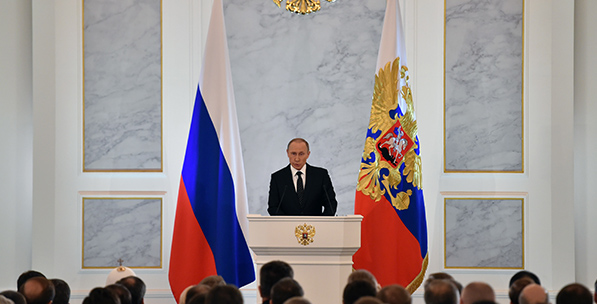Since Turkey shot down a Russian jet for violating its airspace on Nov. 24, President Vladimir Putin has been making strongly-worded statements to keep tensions high. The Kremlin's disproportionate response doesn't stem from Mr. Putin's unbalanced and authoritarian personality but Moscow's intention to keep bilateral relations with Turkey cold. For this purpose, Mr. Putin has been accusing Turkey and, in particular, Turkish President Recep Tayyip Erdoğan of buying oil from DAESH. Last week, the Russian president made a distinction between the Turkish people and the country's leadership to claim that "they will regret their actions."
In truth, Russia's accusations - which Turkish Prime Minister Ahmet Davutoğlu likened to Soviet-style "Pravda lies" - are the product of a carefully crafted campaign. In this day and age, lying doesn't mean that people won't believe the claims. There is no denying that Iran and the PKK are successfully brainwashing certain groups by publishing propaganda pieces repeatedly. Moving forward, Turkey should be prepared to encounter new accusations from Russia precisely because paying lip service to fighting DAESH is the most effective way to playing an active role in Syria.
Over the past weeks, the Russian president has not only accused Turkey of supporting terrorism but also tapped into anti-Erdoğanism, an all-time favorite for the Justice and Development Party's (AK Party) opponents at home. By directly targeting President Erdoğan and his family, Mr. Putin seeks to get under Erdoğan's skin, energize the AK Party's opponents inside Turkey and distract attention from Russia's challenge to NATO. It's important to note that the PKK has been using the same message to keep young militants motivated.
The third goal is to turn the whole episode into a bilateral issue and even a personal dispute between Putin and Erdoğan in order to avoid a much-needed discussion about what the NATO allies must do to counter Russian expansionism in the Middle East. The Western media's eagerness to use stereotypes such as "the clash of empires" and "Tsar vs. Sultan" ultimately serve Moscow's interests. Putin couldn't care less if the world was calling him an unbalanced and authoritarian leader.
And what does Putin seek to conceal behind the smokescreen of anti-Erdoğanism? Here are some examples: The Kremlin wants to weaken the moderate opposition in Syria before the Vienna process kicks off on Jan. 1 while trying to keep the world's eyes fixed on something else. Furthermore, Putin's game plan in Syria isn't limited to helping the Assad regime and assisting the Iran-backed Shiite militia. In a range of issues including energy politics and military bases, he is redefining Russia's long-term interests in the Middle East and Eastern Mediterranean. In an attempt to prevent NATO from seeing Moscow's activities on the ground as part of a broader expansionist agenda, the Kremlin pays lip service to fighting ISIL and targeting Turkey with ridiculous accusations.
Clearly, Turkey's allies in Washington and across Europe see right through the Soviet-style propaganda. The U.S. government, however, hasn't been supportive enough in the face of Russian attacks. And it goes without saying that the West won't be able to keep Russia under control just by keeping a lid on oil prices. Moving forward, the Obama administration will have to take former Pentagon official Evelyn Farkas'swarning seriously: "Mr. Putin is testing our resolve." At this point, it's not enough for Turkey to remain calm and act rationally. The Kremlin's efforts to escalate the crisis alone is a serious enough problem for the Western alliance.
[Daily Sabah, December 7, 2015]







